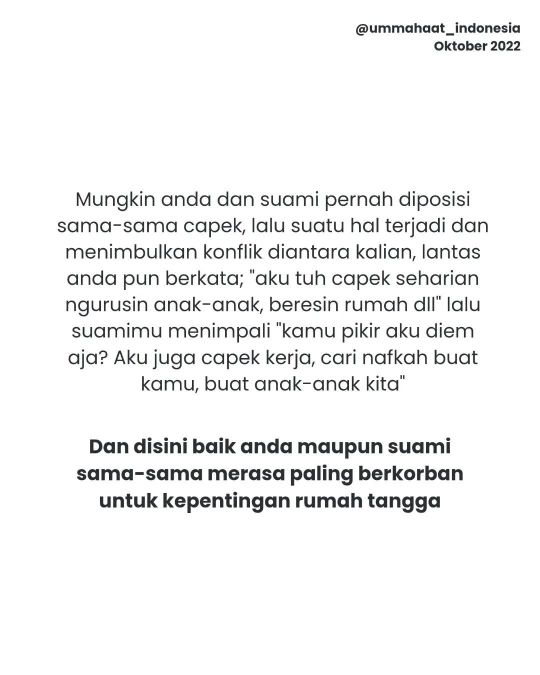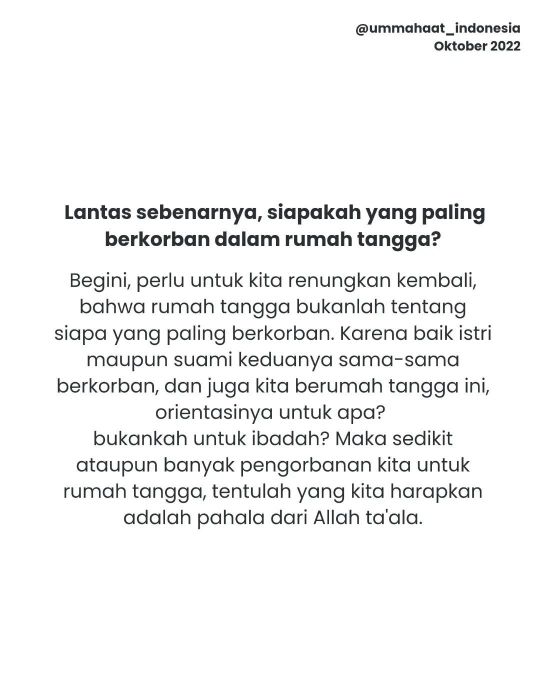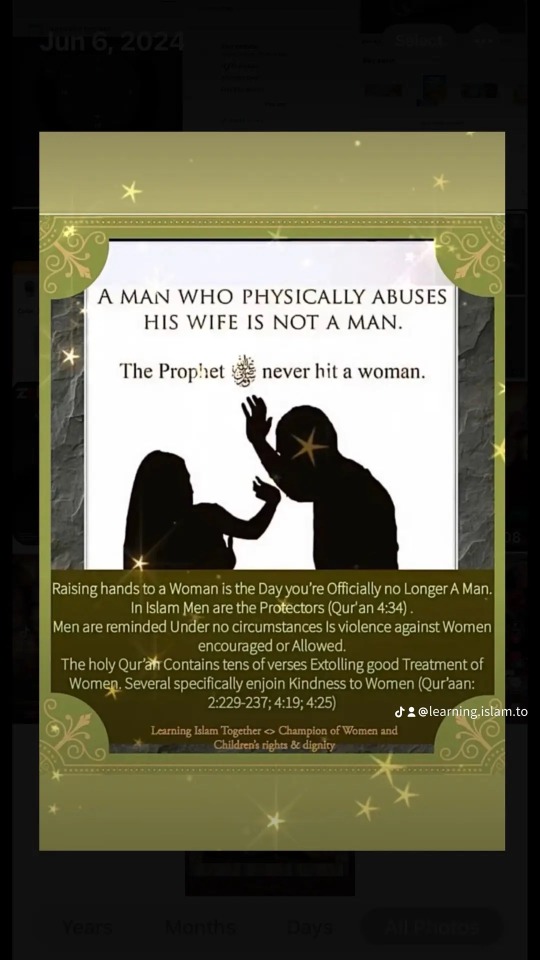#nisa 34
Explore tagged Tumblr posts
Text
الرِّجَالُ قَوَّامُونَ عَلَى النِّسَاءِ
(Men are the protectors and maintainers of women,) meaning, the man is responsible for the woman, and he is her maintainer, caretaker and leader who disciplines her if she deviates.
[Tafsir Ibn Kathir (Abridged) / verse 34 Surah An-Nisa]
#islam#islamic#muslim#muslimah#islamdaily#islamic quotes#islamicreminders#deenislam#islamic posts#islamicquotes#hadith#prophetmuhammadﷺ#allahﷻ#allahswt#allah#quran ayah#quranquotes#quran#quranandsunnah#quran kareem#holy quran#deenbot#deenoverdunya#sunnah#salah#prayer#wisdom#muslim ummah#muslimquotes#muslim revert
102 notes
·
View notes
Text


Guys Islam is a feminist religion!!!! It definitely doesn't allow a foster parent to marry their adopted kid, a breastfed baby can be married and used for sex, children born from rape or incest are seen as "bastards", parents won't be punished for killing their children, women have half testimony, women are seen as deficient, women can't divorce freely, the right of Li’an and Khul is not given to women, women can loose custody of their children if they remarry, women are allowed to be raped and beaten up if they don't disobey, women are seen as misfortune, rape is justified, a man won't be punished for killing women and much more!!!!!!
/sarcastic
Sources:
Ayah An-Nisa 3
Sahih al-Bukhari 5064
Fatwas of the Islamic Network, Al-Maktabah Al-Shamila, vol. 3, p. 8445
Sahih al-Bukhari 6817
Jami` at-Tirmidhi 1401
Al-Baqara 282
Sahih al-Bukhari 304
Al-Baqara 226-228
Islamweb.net
Jami` at-Tirmidhi 1186
Sunan Abi Dawud 2276
An-Nisa 34
Sunan Abi Dawud 3922
Sahih al-Bukhari 3237
Al-Baqara 178
#ex muslim#ex islam#ex religious#leaving islam#leaving religion#religious deconstruction#deconstructing religion#deconversion#apostate#feminism#women liberation#womens liberation#women rights#womens rights#woman rights#woman life freedom
38 notes
·
View notes
Note
How can a Muslim woman best the best wife to her husband?
She is the one who it is thought will guard her chastity and her honour in the husband’s presence and absence, and be diligent with regard to both minor and major issues.
Allah, may He be glorified and exalted, says (interpretation of the meaning): “Therefore the righteous women are devoutly obedient, and guard in (the husband’s) absence what Allah would have them guard” [an-Nisa 4:34]. a righteous woman always shows affection and respect for her husband, does not delay what he likes her to hasten to, nor hastens what he does not like her to do. When the Prophet, sallallahu ‘alayhi wa sallam, was asked about which woman is good, he said: “She who pleases her husband whenever he looks at her, obeys him whenever he orders her, and does not oppose him in herself and his property with what he dislikes.” [Ahmad and An-Nasaa’i]
Obedience is the first right that Islam acknowledges for the husband over his wife. She is required to obey him in everything unless he commands her to do an act of disobedience. The Prophet, , said: “No creature should be obeyed when it comes to disobeying the Creator.” one of the most overlooked characteristics. The first thing you can do in how to be a good Muslim wife to your husband is to give them respect and loyalty.
Men want to know that their wives respect them. In most Muslim households’ men are brought up as breadwinners and heads of the family. This is a fact whether you like it or not, and rearing your feminist head just does not help. To maintain a feminine look and avoid behaving like a man. A woman should know that her husband loves to see her in the house like the sun in the sky without any dark cloud of frowning covering her face, particularly if her husband returns home with a long face for a reason that has nothing to do with her.
There are certain chores we enjoy doing, and others that we hate. But, a good Muslim wife is one who stays on top of the household chores, even those she’d rather not do. Try to schedule a time each day to tackle the household chores so you stay on top of them, and nothing becomes overwhelming for you.
A man wants a partner that makes a home for him, with love and care and who is willing to look after him.
It was said to ‘Aishah (may Allah be pleased with her): Which type of woman is best?
She said: The one who does not know about saying bad things, and she is not crafty like men; her focus is on adorning herself for her husband and taking care of her family.
31 notes
·
View notes
Text

"The Forgotten Mother: How Erasing the Divine Feminine Corrupted Spiritual Truths and Empowered Patriarchy"
The Suppression of the Divine Feminine:
I remember when they tore down her image. The Asherah pole stood tall beside Yahweh’s altar, a symbol of the divine mother’s nurturing presence. But Josiah’s men came with fire and iron, hacking it to splinters. They said she was an abomination, that Yahweh alone should be worshipped. But we knew better. The mothers whispered her name in secret, praying for fertility and protection. They could burn her symbols, but they couldn’t erase her from our hearts.
— A witness to King Josiah's reforms, 2 Kings 23:6
I was a priestess of Astarte. We danced under the moon, honoring the goddess of love and war. But then the men came, calling her a harlot, twisting her name into a curse. They said her temples were dens of sin, that our rites were wicked. They turned the goddess into a demon, erasing her from the heavens and casting her into hell. Our power was stolen, our voices silenced. But the goddess still lives in the blood of every woman who remembers.
— A priestess reflecting on the demonization of Astarte.
Sophia’s wisdom flowed through us, guiding us toward the light. But when the Church fathers gathered their councils, they cast her aside. They called heretical the Gospels that spoke of her—Pistis Sophia, The Sophia of Jesus Christ. They said wisdom belonged to men alone, that divine truth must come through their hands. They feared the light she offered because it made their authority fragile. So they buried her words beneath the weight of their dogma.
— A Gnostic teacher witnessing the suppression of Sophia in early Christianity
I was given to him like a goat or a piece of land. My father struck the deal, and I was his prize. “Your desire shall be for your husband, and he shall rule over you,” they said. I had no voice, no choice. The scriptures made it law: Exodus 20 lists me as property in the same breath as oxen and donkeys. They cloaked my chains in holy words.
— A woman reflecting on her role under the laws of Exodus 20:17 and Genesis 3:16
I heard the words from the pulpit: “Let your women keep silent in the churches, for it is not permitted unto them to speak.” My heart burned, but my lips stayed shut. They said I was born from man’s rib, destined to serve and obey. Paul’s letters—Corinthians, Timothy—became my shackles. The men claimed divine order, but I knew it was fear. Fear of the power they couldn’t control.
— A Christian woman silenced by Pauline doctrine, referencing 1 Corinthians 14:34-35 and 1 Timothy 2:11-12
When he took me as his fourth wife, I knew my fate. The Qur'an allowed it, as long as he treated us “fairly,” but fairness meant nothing. My worth was measured in obedience, my defiance punished by law. “Men are in charge of women,” they said, and Surah An-Nisa sealed my fate. I was his possession, veiled and hidden, my voice lost beneath layers of scripture.
— A woman reflecting on her subjugation under Islamic law, referencing Surah An-Nisa 4:34
While the narratives above are a work of fiction, the events and doctrines mentioned are historically documented.
Here’s a quick breakdown:
1. Asherah Suppression:
Historical Fact: The Bible records King Josiah’s reforms in 2 Kings 23:6, where Asherah poles were destroyed to consolidate monotheistic worship of Yahweh. Archaeological finds, like inscriptions from Kuntillet Ajrud, mention “Yahweh and his Asherah.”
2. Demonization of Astarte:
Historical Fact: Archaeological evidence includes the discovery of nude female figurines in ancient Israelite sites. These figurines, often associated with goddesses like Astarte.
Additionally, in the biblical narrative, king Solomon introduced the worship of the Phoenician goddess Astarte, referred to as "Ashtoreth" (Ashera) in the Masoretic text.
3. Suppression of Sophia in Gnosticism:
Historical Fact: Sophia is central in Gnostic texts like Pistis Sophia and The Sophia of Jesus Christ, which were removed and banned as heretical after the Council of Nicaea (325 CE) and other early Church councils that defined orthodoxy.
4. Women as Property in the Bible:
Exodus 20:17 lists a neighbor’s wife among possessions like a house, servants, and livestock. Genesis 3:16 establishes the hierarchical relationship post-Eden.
5. Pauline Suppression of Women:
1 Corinthians 14:34-35 and 1 Timothy 2:11-12 explicitly instruct women to remain silent and subordinate in church, influencing Christian gender roles for centuries.
6. Islamic Suppression of Women:
Surah An-Nisa 4:34 outlines male authority over women, permitting men to discipline their wives. The Qur'an allows up to four wives if treated justly, though interpretations and implementations vary widely across cultures and history.
The removal of goddesses like Asherah, Sophia, and Shekinah from spiritual traditions wasn’t accidental—it was systematic. Archaeological evidence, such as inscriptions from Kuntillet Ajrud in ancient Israel, shows early Hebrews worshipped Yahweh and his Asherah. Yet, over time, Asherah was erased from sacred texts, her presence scrubbed from worship as monotheism took root. The Deuteronomistic reforms under King Josiah (2 Kings 23) describe the destruction of Asherah poles and temples, further evidence of the active removal of the goddess from public worship.
Similarly, Sophia, the embodiment of divine wisdom, is central in Gnostic texts like The Sophia of Jesus Christ and Pistis Sophia, but these were labeled heretical by the early Church and excluded from the canonical Bible. In mainstream Christianity, the divine feminine became fragmented or wholly absent, replaced by male-centric doctrines. Even the Shekinah, a feminine presence representing divine immanence in the world, was relegated to the fringes of mystical Kabbalistic thought rather than mainstream theology.
Despite this suppression, echoes of the divine feminine persist, particularly in Kabbalah. The Shekinah is still recognized as the feminine aspect of God’s presence, dwelling within Malkuth, the Sephirah representing the material world. But this divine connection was corrupted by the Church’s focus on material domination, wealth accumulation, and earthly power rather than spiritual enlightenment.
In part two of this chapter we will discuss how the corruption of this Devine connection is apparent within the church and manifest itself on each one of the Qliphoth.
As Always I would like to give a sincere thanks to my newest Patreons Mary Grassrope, Dimmy Love, and Joselyne Galaviz and of course anyone who has or is supporting my work. I love you all. If you would like to be mentioned in the comments just follow the link below and become a Patreon. Even if you can only pledge one dallar. It all really helps to keep the content coming.
Patreon.com/themadwitch
#DivineFeminine#goddess worship#SacredFeminine#ancientwisdom#feminist spirituality#hidden truths#herstory#hermetic#hermetic philosophy#hermeticism#kabbalah#magick#occult#pagan#ancient wisdom#witches#conspiracy theories
19 notes
·
View notes
Text
Saat Merasa Berkorban; Cintamu Mulai Pudar.




"Cinta tak kenal pengorbanan, Kekasih, saat kau mulai merasa berkorban, saat itu cintamu mulai pudar." - Sujiwo Tejo
Ketimbang merasa berkorban, bagaimana jika pola pikir yang dibangun adalah memberi yang terbaik dalam rangka beribadah kepada Allah Subhanahu Wata’ala?
Usahanya sama, pola pikirnya berbeda.
Sebagaimana pesan dari Ust. Khalid Basalamah hafidzahullah yang disampaikan beliau dalam sebuah podcast, di mana beliau bahasakan hal ini kepada istrinya di awal menikah,
“Saya dan kamu adalah seorang pegawai di sebuah perusahaan bernama rumah tangga, pemilik rumah tangga ini adalah Allah Subhanahu Wata’ala. Saya pasti memiliki tugas dan kewajiban yang saya jalankan dan itu adalah hak kamu, begitu pun sebaliknya kamu memiliki kewajiban yang merupakan hak saya. Kita jalankan ini dengan baik karena Allah Subhanahu Wata’ala maka kita akan mendapat balasannya, pahalanya.
Demikian, sebuah pondasi pemahaman dahulu. Di mana sebenarnya kita ini sekarang sama-sama sedang menjalani prosesi mengejar pahala satu sama yang lain. Indah sekali rumah tangga itu apabila suami sibuk mencari pahala dari istri. Istri sibuk mencari pahala dari suami.
Detik per detiknya dari ucapan dan perbuatan, semuanya bagaimana membahagiakan pasangan. Sangat indah karena mereka mengejar pahala. Dalam sebuah hadis Bukhari disebutkan, memasukkan kegembiraan dalam hati seorang Muslim adalah amal yang paling Allah Subhanahu Wata’ala cintai, apalagi terhadap pasangan. Senyum dengan saudara Muslim yang lain adalah sedekah, apalagi terhadap pasangan. Padahal Allah Subhanahu Wata’ala sudah menggambarkan suami dan istri adalah pakaian satu sama yang lain. Pahami jika ini adalah ajang pahala. Jadikan ini kesempatan emas."
Bilamana keduanya sama-sama membangun pola pikir demikian, demi mengejar pahala dari Allah Subhanahu Wata’ala maka tidak akan ada yang merasa si paling berkorban satu sama lain dan tidak pula saling menuntut melainkan tumbuh kesadaran di antara masing-masing terhadap pasangannya.
Apabila seseorang sudah merasa berkorban maka tanpa sadar dirinya akan menagih empati dari orang lain. Berbeda halnya, apabila dasar yang dibangun adalah dalam rangka beribadah kepada Allah Subhanahu Wata’ala maka dirinya meyakini bahwa Allah Subhanahu Wata’ala yang akan membalasnya, dengan begitu sekalipun pasangannya tidak berbuat demikian, dirinya tetap on track memberi yang terbaik.
Dalam pembahasan yang lain bersama Ust. Muhammad Nuzul Dzikri hafidzahullah, yaitu membahas QS. An-Nisa': 128 tentang nusyuz dari sisi suami (suami yang zalim) berkebalikan dengan QS. An-Nisa': 34 tentang nusyuz dari sisi istri (istri yang durhaka).
"Dan jika seorang wanita khawatir akan nusyuz atau sikap tidak acuh dari suaminya maka tidak mengapa bagi keduanya mengadakan perdamaian yang sebenar-benarnya dan perdamaian itu lebih baik (bagi mereka) walaupun manusia itu menurut tabiatnya kikir. Dan jika kamu bergaul dengan istrimu secara baik dan memelihara dirimu (dari nusyuz dan sikap tidak acuh) maka sesungguhnya Allah adalah Maha Mengetahui apa yang kamu kerjakan."
Apabila seorang wanita khawatir ada nusyuz dari pihak suaminya, (nusyuz diartikan sebagai zalim/tidak memenuhi haknya) maka solusinya adalah islah, berdamai itu lebih baik. Tidak perlu mengikuti permainan setan sehingga jadi ribut, dsb. Tentu ini bukan hal yang mudah sebab jiwa manusia itu pada dasarnya kikir (sangat menuntut haknya dan suka lupa atau lalai terhadap hak orang lain). Dirinya bersemangat terhadap haknya namun apabila berkaitan dengan hak orang lain suka lupa atau tidak tertarik untuk totalitas dalam memenuhinya. Gaduh ketika terlambat gajian namun ingin dimengerti ketika terlambat 5 menit masuk kerja, misalnya.
Dengan tabiat manusia yang demikian maka islah seringkali gagal, titik temu dalam mencapai perdamaian, apalagi jika pihak lain sedang tidak ‘sehat’, yang emosinya sedang memuncak (bukan islah dengan pihak lain yang takwanya tinggi vs takwanya tinggi) maka jika dalam kondisi yang demikian yang dituntut bukan sekadar memenuhi hak orang lain namun juga harus rela melepas sebagian hak pribadi bahkan mungkin seluruhnya untuk sementara waktu. Dikatakan ulama ini berat bahkan sangat berat sebab istri harus rida haknya dikurangi atau dilepas.
Apalagi sudah menjadi tabiat manusia itu kikir maka dikatakan ulama seyogianya perlu berusaha sekuat tenaga untuk menghilangkan tabiat tersebut dan diganti dengan mental berusaha untuk menunaikan hak orang lain yang merupakan kewajiban diri sendiri dan siap melepas atau memangkas sebagian hak yang merupakan porsimu.
Itulah mengapa islah pahalanya sangat besar dan tidak semua orang mampu sebab untuk memenuhi hak orang lain sudah susah sekali apalagi sampai pada titik melepas hak pribadi. Dan penutup ayat ini, “Sesungguhnya Allah adalah Maha Mengetahui apa yang kamu kerjakan.”
Jika kalian ihsan (beribadah kepada-Nya seakan-akan kamu melihat-Nya dan jika tidak mampu hingga ke level itu maka beribadahlah dengan penuh keyakinan bahwa Dia melihatmu) sehingga ihsan bukan hanya sekadar berbuat baik namun berbuat baik di level tertinggi yaitu berbuat baik dengan keyakinan bahwa Allah Subhanahu Wata’ala sedang melihatmu dan jika ingin lebih maksimal lagi yaitu seakan-akan kamu melihat-Nya. Hanya yang sudah mampu beribadah hingga di level inilah yang juga dimampukan untuk islah dengan tulus sebab bagi seseorang yang hanya mengedepankan dirinya dan dia lupa bahwa Allah Subhanahu Wata’ala melihatnya maka tidak akan mampu.
Begitu seseorang tahu, “Saya tinggalkan hak saya, saya lepaskan hak saya. Saya penuhi haknya demi tercapainya perdamaian, perbaikan hubungan dan Allah Subhanahu Wata’ala melihat saya dan semoga Dia rida dengan apa yang saya lakukan.” maka islah jauh lebih mudah sebab dirinya yakin Allah Subhanahu Wata’ala melihatnya, yakin Allah Subhanahu Wata’ala rida terhadap perbuatannya dan yakin Allah Subhanahu Wata’ala akan mengganjarnya dengan ganjaran yang lebih baik.
Dan apabila kalian ihsan dan bertakwa, menjalankan perintah-Nya, menjauhi larangan-Nya sesungguhnya Allah Subhanahu Wata’ala Maha Mengetahui secara detail bukan hanya secara global atau di permukaan saja. Untuk itu, dirinya akan tenang sebab tahu Allah Subhanahu Wata’ala melihat dan mengetahui secara detail zahir dan batinnya. Allah Subhanahu Wata’ala tahu saya melepas ini bukan tersebab saya takut dengannya atau saya lemah melainkan Allah Subhanahu Wata’ala telah berfirman, ”Perdamaian itu lebih baik.”
“Sesungguhnya nafsu itu selalu menyuruh pada kejahatan kecuali nafsu yang diberi rahmat oleh Tuhanku.” (QS. Yusuf: 53). Nafsu untuk ribut-ribut, ingin pisah ketika hak diambil atau tidak dihargai yang merupakan permainan setan ini memberikan pandangan bahwa inilah yang paling baik. Namun, Allah Subhanahu Wata’ala berfirman bahwa, ”Perdamaian itu lebih baik.”
Allah Subhanahu Wata’ala tahu motif islahmu itu apa, Dia akan rida dan mengganjar dengan kebaikan yang sangat besar. Jadi, masalah besar tidak terjadi islah bukan tersebab peliknya masalah namun akar penyebabnya adalah tabiat manusia yang kikir. Renungkan bahwa konflik dalam kehidupan, “Apakah tersebab masalahnya?” jawabannya tidak, namun tersebab manusianya entah diri sendiri atau pihak lain. Bukan besar kecilnya masalah melainkan ego, arogansi, nafsu, dsb.
Dan di ayat tersebut jelas, diawali permasalahan (seorang wanita khawatir apabila suaminya zalim), dijelaskan pula akar masalah (tabiat manusia yang kikir), lalu diberi solusi (tidak mengapa bagi keduanya mengadakan perdamaian yang sebenar-benarnya dan perdamaian itu lebih baik), ditutup dengan tauhid (Allah adalah Maha Mengetahui apa yang kamu kerjakan) Allah, Al-Kabir yang mengetahui secara global dan detail.
Tidak akan menemukan titik temu atau bersepakat untuk islah dengan konsekuensi melepas sebagian atau seluruhnya hak pribadi apabila tauhid dalam diri seseorang lemah atau hanya sebatas teori. Dan sejatinya inilah ujian kejujuran. Sudahkah melibatkan tauhid kepada Allah Subhanahu Wata’ala dalam menghadapi lika-liku kehidupan berumah tangga?
166 notes
·
View notes
Text
The Verse of Abuse Or the Abused Verse Al-Qur’an 4:34 ~ https://quran.com/en/an-nisa/34-35
Riyad as-Salihin 278
Abu Hurairah (رَحْمَةُ الله عليه) reported:
Messenger of Allah (ﷺ) said, "The believers who show the most perfect Faith are those who have the best behaviour, and the best of you are those who are the best to their wives".
[At-Tirmidhi, who categorized it as Hadith Hasan Sahih].

#learningislamtogether#muslim#hadith#islam#quran#hijab#muslimah#qur’an#allahisone#mashallah#dawah#welcome to islam#islamislove#islam help#islamicreminders#revert islam#ibadah#islamic#islam calligraphy#islamicpost#islamdaily#convert to islam#muslimafication#muslim americans#muslim revert#muhammad#muftimenkreels#muslimahreels#muslimahrevert#nabi muhammad saw
17 notes
·
View notes
Text
What about the Qur'an allowing the beating of women by her husband ?
﷽
In Surah Nisa verse 34
Allah ﷻ says ;
And if you sense ill-conduct from your women, advise them ˹first˺, ˹if they persist,˺ do not share their beds, ˹but if they still persist,˺ then discipline them ˹gently˺.2 But if they change their ways, do not be unjust to them. Surely Allah is Most High, All-Great.
The ill conduct includes ;
Disobeying husband in legitimate reasons for eg wear hijab etc. Talking to non mahrams with desire, being alone with non mahram, showing off her body to another man as you can see these days and rebellious against husband.
So Allah advises the man first to verbally tell her and if she stopped treat her rightly and do not overstep the boundary of Allah like still hurt her or likes.
If she didn't listen then abandon her presence in the house and have no relation with her as in yk but not outside of the house.
In brief - emotional punishment for her disobedience.
And if the matter worsens.
Allah ﷻ says hit her ( lightly) which neither harm her physically not mentally and not even leave a scar on her. Like the salaf ( pious predecessor) and scholars used to hit their wives if this situation arises with a thobe or siwak which is light and dont even feel on skin. Just to show I'm angry with you.
The Prophet (صَلَّى اللّٰهُ عَلَيْهِ وَسَلَّمَ) never hit his wives in his entire life even though the verse was revealed to him and hus (صَلَّى اللّٰهُ عَلَيْهِ وَسَلَّمَ) wives ( Aisha and Hafsah رضى الله عنه used to fight with him often verbally but he never hit them nor allowed his companions to hit them ).
As for beating her like man or punching her is haraam and will be severely dealt by Allah.
Nowadays people of desire say it in the Qur'an without understanding it and wallahi there are so many cases reported everyday of domestic abuse. May Allah protect us from such wild creatures.
And Allah knows best
#islam#islamdaily#quranandsunnah#islamic#islamicpost#quranquotes#islam help#islamislove#al quran#convert to islam
6 notes
·
View notes
Text
11 Agustus 2024 Pesan dari Bp. Zainal Abidin: Bagi calon istri, pelajari apa saja kewajiban seorang istri. Bagi calon suami, pelajari apa saja kewajiban seorang suami. -------- Jadi, apa saja kewajiban seorang istri? Dalam Islam, kewajiban seorang istri terhadap suaminya diatur oleh prinsip-prinsip yang bersumber dari Al-Qur'an dan Hadits. Beberapa kewajiban utama seorang istri menurut Islam:
Taat kepada Suami dalam Hal yang Makruf (Baik): -> Seorang istri diwajibkan untuk taat kepada suaminya selama perintah tersebut tidak bertentangan dengan ajaran Islam. Ini mencakup hal-hal seperti menjaga keharmonisan rumah tangga dan menghormati suaminya. -> Dalam Al-Qur'an, disebutkan, “Kaum laki-laki itu adalah pemimpin bagi kaum wanita, karena Allah telah melebihkan sebagian mereka (laki-laki) atas sebagian yang lain (wanita), dan karena mereka (laki-laki) telah menafkahkan sebagian dari harta mereka…” (QS. An-Nisa: 34). 2. Menjaga Kehormatan Diri dan Rumah Tangga: -> Istri harus menjaga kehormatan dirinya serta tidak membiarkan orang lain masuk ke dalam rumah tanpa seizin suami. Ini termasuk menjaga aib rumah tangga dan tidak mengumbar masalah rumah tangga ke luar. -> Rasulullah SAW bersabda, "Sebaik-baik wanita adalah yang apabila engkau memandangnya, ia menyenangkanmu; jika engkau memerintahnya, ia mentaatimu; jika engkau bersumpah atasnya, ia menepati sumpahmu; dan jika engkau pergi, ia menjaga dirinya dan hartamu.” (HR. Abu Dawud). 3. Melayani Suami dengan Baik: -> Seorang istri dianjurkan untuk melayani suaminya dengan baik, termasuk dalam hal kebutuhan fisik, emosional, dan spiritualnya. -> Rasulullah SAW bersabda, "Jika seorang istri menunaikan shalat lima waktu, berpuasa di bulan Ramadhan, menjaga kemaluannya, dan menaati suaminya, maka ia akan masuk surga dari pintu mana saja yang ia kehendaki." (HR. Ahmad). 4. Menjaga Harta Suami: -> Istri bertanggung jawab untuk menjaga dan mengelola harta suaminya dengan amanah. Hal ini mencakup menghindari pemborosan dan menggunakan harta sesuai dengan kebutuhan yang benar. -> Dalam Al-Qur'an, disebutkan, "Maka wanita-wanita yang shalih adalah yang taat kepada Allah lagi memelihara diri ketika suaminya tidak ada, oleh karena Allah telah memelihara (mereka)…" (QS. An-Nisa: 34). 5. Mendidik Anak dengan Nilai-Nilai Islam: -> Sebagai seorang ibu, istri juga memiliki kewajiban untuk mendidik anak-anaknya dengan nilai-nilai Islam dan membesarkan mereka dalam lingkungan yang Islami. 6. Memberi Dukungan/ Support: -> Istri juga diharapkan memberikan dukungan kepada suaminya dalam menghadapi masalah, serta berusaha untuk menciptakan suasana rumah tangga yang penuh kedamaian dan kasih sayang. Dukungan secara emosional (memberi ketentraman, menghiburnya), dukungan dalam beribadah (mendorong ketaatan kepada Allah, mengajak kepada kebaikan), membantu dalam urusan kehidupan sehari-hari (mengelola rumah tangga, menjaga harta suami), dukungan dalam karir dan pekerjaan (menyemangati dan memotivasi), menjaga keharmonisan dan kedamaian rumah tangga (menghindari konflik yang tidak perlu, memelihara kasih sayang).
Semua kewajiban ini dijalankan dengan dasar cinta, kasih sayang, dan saling menghormati dalam pernikahan, sebagaimana suami juga memiliki kewajiban untuk memperlakukan istri dengan baik, penuh kasih sayang, dan menghormati hak-hak istri sesuai dengan ajaran Islam.
11 notes
·
View notes
Text

#KUR'AN DA #GEÇEN #MÜ'MİNLERİN 100 #ÖZELLİĞİ:
1. İnsanlar arasında adaletle hükmederler.
/ En’am-151.
2. #ALLAH’a asla şirk koşmazlar.
/ Furkan-68
3. Namuslarını (ırzlarını) korurlar.
/ Furkan-68
4. Hakkı bile bile gizlemezler.
/ Bakara-44
5. Namazlarını huşu içinde ve doğru olarak kılarlar.
/ Mü’minun 2,9
6. Anne ve babalarına “öf” bile demezler.
/ İsra-23
7. Boş şeylerden tümüyle yüz çevirirler.
/ Mü’minun -3
8. Mallarıyla ve canlarıyla cehd ederler/çabalarlar. Tevbe-5
9. Asla zanda bulunmazlar.
/ Casiye -24
10. Cahillerle asla tartışmazlar.
/ Furkan-63
11. Kınayıcının kınamasından korkmazlar.
/ Maide-54
12. Asla yalan söylemezler.
/ Mü’minun-8
13. Emanetlerine ihanet etmezler. / Bakara-177
14. Söz verdiklerinde sözünde dururlar. / Bakara-177
15. Zekâtlarını hakkıyla verirler. / Bakara-177
16. Yetimin hakkını asla yemezler. / Nisa-2
17. Yolda kalmışlara yardım ederler. Bakara-177
18. Kafirlere karşı sert, birbirlerine karşı merhametlidir. / Fetih-29
19. İnsanların kusurlarını affederler. / Al-i İmran-135
20. Yalnızca ALLAH’a dayanıp güvenirler. / Tevbe-20
21. (Savaş gerektiği zaman) Kâfirler ile ALLAH yolunda savaşırlar. A.imran-28
22. Darlıkta da bollukta da infak ederler. A.İmran-133
23. Kızdıkları zaman öfkelerini yenerler. A.İmran-133
24. Başkalarının ilahlarına sövmezler. En’am-108
25. Haksız yere bir cana kıymazlar. / En’am-151
26. ALLAH’ın ayetlerini az bir pahaya satmazlar. / Al-i İmran-199
27. Zinaya asla yaklaşmazlar. / Mü’minun -5
28. İnananlara ‘sen mü’min değilsin’ demezler. / Nisa-94
29. Rasullerden hiçbirini birinden ayırt etmezler. / Bakara-136
30. Yeryüzünde alçak gönüllü olarak yürürler. / Furkan-63
31. Ölçüyü ve tartıyı doğru olarak yaparlar. / En’am-52
32. Helal ve temiz olan şeylerden yerler. / Bakara-168
33. Asla yalan şahitlik yapmazlar. / Furkan-72
34. Dillerini eğip bükerek (geveliyerek) Allah adına yalan konuşmazlar. / Nisa-135
35. ALLAH’ın adı anıldığında kalpleri ürperirler. / Enfal-2
36. Yoksulluk yüzünden evlatlarını öldürmezler. / En’am-151
37. Yeminlerini hiçbir zaman bozmazlar. / Nahl-91
38. Adaklarını yerine getirirler. / İnsan-7
39. ALLAH’ın ahdini yerine getirirler, anlaşmayı bozmazlar. / Ra’d-20
40. Yakınlarına (akrabalarına) yardım ederler. / Bakara-177
41. Yolda kalmışlara ve hastalara yardım ederler. / Bakara-177
42. Yoksullara ve esir düşenlere yardım ederler. / Bakara-177
43. Zorda, darda ve savaş anlarında sabrederler. / Bakara-177
44. Verilen rızıktan yerli yerince harcarlar. / Enfal-3
45. Kuranı ağır ağır düşünerek okurlar. /Müzemmil /4
46. Dinde zorlama ve baskı yapmazlar./ Bakara/ 256
47. İnsanlara iyiyi emreder, kötülükten de alıkorlar. / Enfal-71
48. Açıklanınca hoşlarına gitmeyecek şeyleri sormazlar. / Maide-101
49. Yapacakları işlerde kendi aralarında danışırlar. / Şûra-38
50. Gerçekten felaha kavuşanlardır. / Mü’minun-1
51. Müminler ancak ALLAH'a kulluk eder, yalnız ondan yardım dilerler. (Fatiha/5)
52. ALLAH'tan korkup-sakınırlar, yasakladığı şeyleri yapmaktan çekinirler.
(Âl-i İmran/102)
53. Yalnızca ALLAH'a güvenirler. Ondan başka kimseden korkmazlar.
(Bakara/249)
54. ALLAH'a şükrederler. Darlıkta ya da bollukta üzülmez ya da böbürlenmezler.
(Bakara/172)
55. Kesin bilgiyle iman etmişlerdir. ALLAH'ın rızasını kazanmaya çalışırlar.
(Hucurat/15)
56. Kur'an'a kuvvetle bağlıdırlar. Tüm hareketlerini Kur'an'a göre düzenlerler. İnsanları Kur'an'a ile uyarırlar.
(A'raf/170)
57. ALLAH'ın her şeyi gören ve işiten olduğunu bilir, sürekli ALLAH'ı hatırda tutarlar.
(Âl-i İmran/191)
58. ALLAH karşısında acizliklerini bilirler. Mütevazidirler.
(Bakara/286)
59. Her şeyin ALLAH'tan olduğunu bilirler. Telaşa kapılmaz, serinkanlı ve tevekküllü davranırlar.
(Tevbe/51)
60. Asıl hedefleri ahireti kazanmaktır. Ancak dünya nimetlerinden de faydalanır, dünyayı yaşanabilir hale getirmek için çalışırlar.
(Nisa/74)
61. Sadece ALLAH'ı ve müminleri dost ve sırdaş edinirler.
(Maide/55-56)
62. Akıl sahibidirler. Sürekli dikkatli ve uyanıktırlar. Devamlı olarak müminlerin ve dinin lehine akılcı hizmetler yaparlar.
(Mümin/54)
63. İnkarcılara karşı büyük bir fikri mücadele verirler. Yılmadan, gevşemeden mücadelelerini sürdürürler.
(Enfal/39)
64. Hakkı söylemekten çekinmezler. İnsanlardan çekindiklerinden dolayı gerçeği açıklamaktan geri kalmazlar. Kınayıcıların kınamasından korkmazlar.
(Maide/54, 67)
65. ALLAH'ın dinini tebliğ ederler. Çeşitli biçimlerde insanları ALLAH'ın dinine davet ederler. (Nuh/5-9)
66. Baskıcı değillerdir. Merhametli ve yumuşak huyludurlar.
(Nahl/125)
67. Öfkelerine kapılmazlar, hoşgörülü ve bağışlayıcıdırlar.
(Âl-i İmran/134)
68. Güvenilir insanlardır. Son derece güçlü bir kişilik sergiler, etraflarına da güven telkin ederler.
(Duhan/17-18)
69. Onlar güzel ahlak sahibidirler. Kalem/4
70. Eşleriyle iyi geçinirler. Nisa/19
71. Zulümden ve öldürülmekten korkmazlar. Zorluklara katlanırlar.
(Ankebut/2-3,Tevbe/111)
72. İnkarcıların saldırı ve tuzaklarıyla karşılaşır, alaya alınırlar
#islam#ayetelkürsi#islamic#animation#kuran#ayetler#hz muhammed#dua#allah#gif#dualar#hadisler#sure#photography#artists on tumblr#artwork#art#cottagecore#naturecore#light academia#flower#flowers#fantasy#animated
14 notes
·
View notes
Text
U Kur’anu se spominje kako da:
1. Hodamo
“Ne hodi po zemlji nadmeno.” (El-Isra, 37)
“I ne idi zemljom nadmeno.” (Lukman, 18)
2. Jedemo i pijemo
“I jedite i pijte ali ne pretjerujte.” (El-A’raf, 31)
3. Govorimo
“ Reci robovima Mojim da govore samo lijepe riječi.” (El-Isra, 37)
“U govoru ne budi grlat.” (Lukman, 19)
4. Kako postupati u razilaženjima
“A ako se u nečemu ne slažete, obratite se Allahu i Poslaniku.” (En-Nisa, 59)
5. Kako da se ophodimo prema roditeljima
“Ne reci im ni ‘uh’” (El-Isra, 23)
“ Mi smo naredili čovjeku da bude poslušan roditeljima svojim.” (Lukman, 14)
6. Kako da se ophodimo prema ženama
“S njima lijepo živite!” (En-Nisa, 19)
7. Kako da se ophodimo prema drugima
“I ne uhodite jedni druge i ne ogovarajte jedni druge.” (El-Hudžurat, 12)
8. Kako da se ophodimo prema onome ko nas prezire
“Na zlo dobrim uzvrati, pa će ti dušmanin tvoj odjednom prisni prijatelj postati” (Fussilet, 34)
9. Kako da se ophodimo prema imetku drugih ljudi
“I ne prisvajajte međusobno imetke na nedozvoljen način.” (En-Nisa, 29)
10. Kako sačuvati dobra djela
“Ne kvarite svoju milostinju prigovaranjem i uvredama.” (El-Bekara, 264)
Ovo su samo neki primjeri kur’anskog odgoja ljudi, a kojih je jako mnogo u Allahovoj Knjizi. Zar ljudi ne bi bili sretni primjenom kur’anskih savjeta i načela?!
18 notes
·
View notes
Text

CHARACTER INTRO:
NAME: Anisa Marisol Torres
NICKNAME: Nis, Nisa.
AGE: 34
GENDER/PRONOUNS: Female. She/her.
SEXUALITY/STATUS: Bisexual. | Single.
OCCUPATION: Surgical Intern. Former Stripper and Camgirl.
BIRTHDAY: May 20th, 1990
HOMETOWN: Reno, Nevada
NEIGHBORHOOD: Downtown
FACECLAIM: Eiza Gonzalez
ABOUT PAGE | PINTEREST
BACKGROUND:
TW: CHILD NEGLECT AND ABUSE. SEX WORK, NARCISSISTIC ABUSE.
Conceived in an attempt to trap a wealthy man. Her mom would quickly learn that a child does not bind a man to you for life.
The oldest child of Santos Torres would seem to be a gift to anyone else, but for Anisa, it meant nothing. Her father knew of her existence, and might have attempted to be in her life at some point. But when her mother, Gina Lopez, started making it hard, Santos hardly put up much of a fight.
Her dad would go on to marry someone else and have two kids with her. These two kids claimed, while Anisa was more of an open secret.
Anisa had to learn how to take care of herself early on, and would learn that her mother did not care to protect her. It would even get worse when she began to realize that her child was beautiful. Jealous and disgusted with the girl, Gina often threw her to the wolves.
Having a second daughter was hardly a gift for Gina. Add in that it was another girl, and she was truly disgusted. Anisa and her sister, Bianca would grow up pinned against each other by a Narcissistic mother. Which would leave their relationship strained for majority of their lives.
When Anisa was a teen, she'd run away from home, ending up on her father's steps. She would learn that she wasn't anymore welcomed there than she was with her mom, and after some time, she'd find herself returning home with her tail between her legs.
Growing up with the notion that she was only good for her looks, Nisa would use that to her advantage when she turned 18. Taking her first stripping job, she'd find herself literally rolling in thousands of dollars.
She'd also take it upon herself to get into sugarbabying and camming work. If men were trash, she'd be the raccoon. She hardly ever went by her real identify, however. Usually going up the surname of Anastasia.
She knew rather early on that she didn't want this to be her life forever, and that she wanted to do something that gave back. She always had an interest in medicine, and she found herself interested in surgrey. It gave her a power that she could only hope for.
She'd go to school, but would step back for a little while when her sister ended up pregnant. Needing help with the little girl, and knowing that their mom would only destroy her. Anisa took it upon herself to take her niece in and give her the best life possible. She was capable of giving her anything and everything she wanted, and she did. Once her niece got a little older, and her sister more on stable ground, Anisa would go back to school, kicking ass and graduating, she'd find herself now going on in her first year as a surgical resident.
Had a German Shepherd named Goldie, and thats her best friend. She also just recently got her niece a kitten.
WANTED CONNECTIONS:
FRIENDS: She's sociable, and would get a lot with the lot.
PEOPLE WHO KNOW HIM THROUGH HER SIBLINGS/FAMILY: She has four siblings. One via her mother, and two via her father. Her father is also the ruling judge of Reno, and Anisa is his open secret around the city.
ENEMIES/I DON’T REALLY LIKE YOU: She doesn't back down, and if someone wants to hassle with her, she will hassle.
EXES/FRIENDS WITH BENEFITS/HOOK UPS (F/M/NB): She has had a lot of different relationships. So we could pretty much go crazy here. It could be a bad break up, it couldve been a good one. It could be a fun fling. It could even be the man or the kids of a man she had sugarbabyed with.
CLIENTS: Anyone who would’ve possibly known her while she was in sex work. She doesn't broadcast it often, however.
COWORKERS: Anyone who works in the hospital could very likely know her. Anyone who might have stripped with her can as well.
TRULY ANYTHING AND EVERYTHING, FOR REAL. I JUST WANNA LOVE ON Y’ALL AND BE LOVED. OK THANK YOU
2 notes
·
View notes
Text
Surah In Al-Quran.
1. Al-Fatiha
2. Al-Baqarah
3. Aal-i-Imran
4. An-Nisa'
5. Al-Ma'idah
6. Al-An'am
7. Al-A'raf
8. Al-Anfal
9. At-Taubah
10. Yunus
11. Hud
12. Yusuf
13. Ar-Ra'd
14. Ibrahim
15. Al-Hijr
16. An-Nahl
17. Al-Isra
18. Al-Kahf
19. Maryam
20. Ta-Ha
21. Al-Anbiya
22. Al-Haj
23. Al-Mu'minun
24. An-Nur
25. Al-Furqan
26. Ash-Shu'ara'
27. An-Naml
28. Al-Qasas
29. Al-Ankabut
30. Ar-Rum
31. Luqman
32. As-Sajdah
33. Al-Ahzab
34. Saba'
35. Al-Fatir
36. Ya-Sin
37. As-Saffah
38. Sad
List of 114 Surahs
39. Az-Zumar
40. Ghafar
41. Fusilat
42. Ash-Shura
43. Az-Zukhruf
44. Ad-Dukhan
45. Al-Jathiyah
46. Al-Ahqaf
47. Muhammad
48. Al-Fat'h
49. Al-Hujurat
50. Qaf
51. Adz-Dzariyah
52. At-Tur
53. An-Najm
54. Al-Qamar
55. Ar-Rahman
58. Al-Mujadilah
59. Al-Hashr
77. Al-Mursalat
78. An-Naba
60. Al-Mumtahanah
79. An-Nazi'at
61. As-Saf
62. Al-Jum'ah
63. Al-Munafiqun
64. At-Taghabun
65. At-Talaq
66. At-Tahrim
67. Al-Mulk-
68. Al-Qalam
69. Al-Haqqah
70. Al-Ma'arij
71. Nuh
72. Al-Jinn
56. Al-Waqi'ah
57. Al-Hadid
73. Al-Muzammil
74. Al-Mudaththir
75. Al-Qiyamah
76. Al-Insan
80. 'Abasa
81. At-Takwir
82. Al-Infitar
83. Al-Mutaffifin
84. Al-Inshiqaq
85. Al-Buruj
86. At-Tariq
87. Al-A'la
88. Al-Ghashiyah
89. Al-Fajr
90. Al-Balad
91. Ash-Shams
92. Al-Layl
93. Adh-Dhuha
94. Al-Inshirah
95. At-Tin
96. Al-'Alaq
97. Al-Qadar
98. Al-Bayinah
99. Az-Zalzalah
100. Al-'Adiyah
101. Al-Qari'ah
102. At-Takathur
103. Al-'Asr
104. Al-Humazah
105. Al-Fil
106. Quraish
107. Al-Ma'un
108. Al-Kauthar
109. Al-Kafirun
110. An-Nasr
111. Al-Masad
112. Al-Ikhlas
113. Al-Falaq
114. An-Naas
6 notes
·
View notes
Text
TIDAK ADA SUAMI YANG JUJUR
Tidak ada suami yang jujur. Maksudnya? Tidak ada suami yang benar-benar menceritakan sejujurnya betapa berat perjuangannya di luar sana. Ia tidak akan bilang kalau tadi bosnya memakinya di depan kolega, kalau ada orang yang menghina pakaiannya yang lusuh, atau kalau ia menahan lapar agar gajinya cukup untuk keluarga. Semua ia simpan sendiri, dengan senyum yang tetap ia pertahankan saat pulang ke rumah.
Rasulullah ﷺ pernah bersabda, *“Kalian semua adalah pemimpin, dan setiap pemimpin akan dimintai pertanggungjawaban atas yang dipimpinnya...”* (HR. Bukhari dan Muslim).
Seorang suami adalah pemimpin rumah tangga, ia memikul tanggung jawab besar di pundaknya, bukan hanya untuk memenuhi kebutuhan materi, tapi juga untuk melindungi keluarganya dari kesulitan dan beban hidup yang mungkin ia sendiri rasakan setiap hari.
Sebelum cemberut karena suamimu lupa membelikan sesuatu, berhentilah sejenak dan tanyakan pada diri sendiri: sudah berapa banyak tetes keringat yang ia habiskan demi keluarganya? Sebelum marah karena ia tidak memenuhi keinginanmu, tatap matanya dan perhatikan: mungkin tanpa sadar mata itu sudah sering menangis diam-diam demi memastikan dirimu dan anak-anak tetap tersenyum. Ia menelan segala keluhannya sendiri, bukan karena sombong, tapi karena ia ingin menjaga martabatnya di depan istri dan anak-anak yang ia cintai.
Allah berfirman dalam Al-Qur'an,
“Kaum laki-laki itu adalah pemimpin bagi kaum perempuan...” (QS. An-Nisa: 34).
Sebagai pemimpin, suami sering kali tak pandai mengungkapkan rasa lelahnya. Namun, itu bukan berarti ia tidak mencintaimu. Ia hanya ingin memastikan bahwa keluarganya merasa tenang dan bangga padanya. Maka, untuk para istri, bersyukurlah atas setiap usaha kecil maupun besar yang suami lakukan. Berikan ia dukungan, bukan hanya tuntutan. Doakan ia dalam sujudmu, karena lelahnya adalah berkah bagi keluarga.
Dan untuk para suami di mana pun berada, yakinlah bahwa lelahmu tidak pernah sia-sia. Allah melihat setiap langkah dan pengorbananmu.
Rasulullah ﷺ juga bersabda,
“Tidak ada sesuatu yang engkau nafkahkan yang mencari keridhaan Allah, kecuali engkau akan diberi pahala, bahkan makanan yang engkau suapkan ke mulut istrimu.” (HR. Bukhari dan Muslim).
Semoga lelahmu menjadi berkah, keluargamu menjadi sakinah, dan Allah ridha atas setiap usahamu. Amin.
3 notes
·
View notes
Text

Kızını Dövmeyen Dizini Döver
✍🏻 Yılmaz Dikbaş
https://www.gundemarsivi.com/kizini-dovmeyen-dizini-dover/
Kadın cinayetleri her geçen gün artarak sürmektedir.
İşte, beş yılda öldürülen kadın sayıları:
2015 yılında 303,
2016 yılında 328,
2017 yılında 409,
2018 yılında 440,
2019 yılında 374
…
Son 10 yılda Türkiye’de 4197 (dört bin yüz doksan yedi) kadın öldürülmüştür.
Dünyada en çok kadın cinayeti işlenen ülke Türkiye’dir.
Bu neden böyledir?
Kadın öldüren caniler ne tür bir iklimde yetişmektedir?
İşte başlıca etkenler:
KADINA ŞİDDET İÇEREN ATASÖZLERİ VE DEYİMLER
Türk erkek çocukları okullarda şu atasözlerini öğrenir:
Kızını dövmeyen dizini döver.
Kızın var mı, derdin var.
Kadın, erkeğin şeytanıdır.
Kadı, erkeğin çarığı gibidir. (Yani istediği zaman çıkarıp atar)
Kızın var, sızın var.
Oğlan doğuran övülsün, kız doğuran dövülsün.
Anasına bak, kızını al.
Saçı uzun aklı kısa.
Kızı gönlüne bırakırsan ya davulcuya kaçarya zurnacıya.
Babasının öğlu.
Karı gibi konuşmak.
Çocuksu kadın meyvesiz ağaca benzer.
Kocanın vurduğu yerde gül biter.
Kadının sırtından sopayı, karnından sıpayı eksik etmeyeceksin.
Kocamdır, sever de döver de.
Dua et, kadınsın!
Kır dizini otur evinde.
Elinin hamuruyla erkek işine karışmak.
KADINA ŞİDDET İÇEREN TÜRKÜLER, ŞARKILAR
Türk erkek çocukları şu tür türkü ve şarkıları dinleyerek büyür:
Trabzon Maçka türküsü:
Yavuz geliyor Yavuz da
Denizi yara yara
Kız ben seni alacağım da
Başına vura vura
Maçkalı erkek çocuklara ana babaları, yakınları ve de öğretmenleri SEVMEYİ öğretmiyorlar!
SEVMEYİ BİLMEYEN DÖVER!
SEVİŞMEYİ BİLMEYEN ÖLDÜRÜR!
İngiltere’de üniversitede ilk yıllarımda Amerika’nın Vietnam savaşına karşı yapılan protesto yürüyüşlerine katılıyor, yakamda üzerinde küçücük dört sözcük bulunan şu rozeti taşıyordum:
MAKE LOVE NOT WAR. Türkçesi: SAVAŞMA SEVİŞ.
Sevmek, aşık olmak ve sevişmek insanlara özgüdür.
Hayvanlar sevmez, aşık olmaz, sevişmezler. Sadece belirli zamanlarda, üreme amaçlı, çiftleşirler.
PKK yandaşı, şarkıcı İbrahim Tatlıses çığırıyor:
Kız ben seni vurmaz mıyım
Saçlarından asmaz mıyım
Karadenizli azmış nara atıyor:
Gelevere deresi iki dağın arası
Yüzünden silinmesin piçağumun yarası
Ünlü pop şarkıcı Erkin Koray‘ın “Deli Kadın” şarkısı:
Deli kadın hiç sen beni anlamadın
Sopa mopa kâr etmiyor taş kafana
Rana Alagöz, “Dayak Cennetten Çıkma” şarkısıyla kadınlara öğüt veriyor:
Sakın kızdırma onu
Döver pata pata
Sonra karışmam
O çok aksi pata pata
Bak dayak cennetten çıkma
Döver pata pata
Memeleri yeni tomurcuklanmış, hiç el değmemiş huriler erkeklere veriliyor, kadınlara ise dayak! İşte size cennet!
TÜRK FİLMLERİNDE KADINA ŞİDDDET
Türk erkek çocukları ve delikanlıları şu yerli filmleri izleyerek kadını tanır:
Kızını Dövmeyen Dizini Döver, Çaresizlik, Vurun Kahpeye, Leke, Neşeli Günler, Çöpler Köpekler, Gülen Gözler, Terazi. 9 aylık. Dört Yapraklı Yonca, Kuyu, Barda, Halam Geldi, Kurtuluş Son Durak, Killing İstanbul, İffet, Kadın Düşmanı.
KADINA ŞİDDET İÇEREN TÜRK TV DİZİLERİ
Türk erkek çocukları, delikanlılar ve de yetişkinler her akşam şu dizileri izleyerek ders alırlar:
Kızıl Goncalar, Ömer, Sen Anlat Karadeniz, Alemin Kralı, Unutulmaz, Ufak Tefek Cinayetler., Kızılcık Şebeti, Yasak Elma, Sadakatsiz, Hercai, Doğduğun Ev Kaderindir, Aşk Ağlatır, Hayat Devam Ediyor, Aşk-ı Memnu.
KURAN’DA KADINA ŞİDDET
Kadın katillerinin tümü “milli ve manevi” değerlere bağlı, muhafazakâr MÜSLÜMAN’dır.
İslam’ın kutsal Kitabı Kuran’da. Nisa Suresi 34. Ayet’de Allah. Erkek kullarına şu öğütü verir:
“Sadakatsizlık ve iffetlerinden korktuğunuz kadınlara önce öğüt verin. Sonra onları yataklarında yalnız bırakın ve nihayet onlarıevden çıkarın/bulundukları yerden başka yere gönderin/onları DÖVÜN.”
(Kaynak: Prof. Dr. Yaşar Nuri Öztürk. “Kuran-ı Kerim Meali-Türlçe Çeviri”)
Müslüman Türkler, Kuran’ı Türkçe okumadıkları için bilmezler!
Ama Müslüman Türk çocuklarının çoğu evlerinde, yukarıdaki Ayetin uygulamasını defalarca yaşarlar, babaları annelerini sık sık acımasızca DÖVER!
OSMANLI’DA KADIN
Altı yüz yıldan uzun bir süre (1300-1920) Anadolu Türk halkı Osmanlı’nın boyunduruğu altında kaldı.
Osmanlı’da kadın, ikinci sınıf vatandaş bile değildi.
Osmanlı’da kadın vatandaş değildi!
Nüfus sayımlarında, evlerde erkekler yazılırken kadınlar sayılmazdı! Yani Osmanlı, kadını insan olarak bile görmezdi!
Osmanlı’da kadın, alınıp satılan MAL’dı.
Osmanlı’da kadın, esir pazarlarında satılırdı.
Dillere destan Osmanlı Haremi’ndeki kadınlar, Avrupalı Hıristiyan/Yahudi kadınlardı. Avrupa ülkelerini işgalde Osmanlı, genç kadınları, kızları ve de parlak oğlanları esir alır, Payitaht’ta getiri, en güzelleri seçilip Saray’ın Haremi’ne gönderilirdi.
Harem, köle kadınlar hapishanesiydi!
Padişahlar bu kölelerle çiftleşirdi.
Değerli Dostlar.
Osmanlı’da kadın, çok önemli bir konudur.
Ben bu konuyu çok sağlam kaynaklara ve belgelere dayanarak, “KADININ ADI YOK” başlıklı bir makale olarak hazırladım. Bu makalemi, yine bu Facebook sayfamda bilgilerinize sunuyorum. Okumanızı öneririm.
Türk gençlerinin büyük çoğunluğu Osmanlı tarihini sağlam kaynaklardan okuyup öğrenmediler.. Osmanlı hakkında bildikleri uyduruk TV dizileri ve sözde tarih hocası, Osmanlı sevdalısı saray dalkavukları Prof. Dr. İlber Ortaylı ve Prof. Dr. Erhan Afyoncu’nun anlattığı masallardır.
KADIN CİNAYETLERİNE KARŞI ÖRGÜTLENEN KADINLAR
Özgür akıllı aydın kadınlar Türkiye’nin 81 ilinde ve birçok ilçede bir araya geldiler, kadına şiddete karşı örgütlenip dernekler kurdular.
İşte o dernekler:
Kadınlarla Dayanışma Vakfı (Birçok ilde şubeleri var), Mavi Kalem Sosyal Yardımlaşma ve Dayanışma Derneği, Kadın Hakları Derneği, Kadın Cinayetlerini Durduracağız Platformu, Mor Dayanışma Derneği, Antalya Kadın Danışma ve Dayanışma Derneği, Mor Salkım Kadın Dayanışma Derneği, Edirne Kadın Merkezi Danışma Derneği, Erzurum Katre Danışma ve Dayanışma Derneği, İstanbul Mor Çatı Kadın Sığınağı, İzmir Kadın Dayanışma Derneği, Mersin Bağımsız Kadın Derneği, Mersin Mimoza Kadın Derneği, Fethiye Kadın Danışma ve Dayanışma Derneği, Bodrum Kadın Dayanışma Derneği, Van Star Kadın Derneği.
Kadına Şiddete Karşı örgütlenen tüm dernek ve kuruluşların yöneticileri ile tüm üyelerine sevgi ve saygılarımı yolluyorum…
Yılmaz Dikbaş
8 Mart 2024, Cuma
0532 233 31 52
#GündemArşivi #YılmazDikbaş #8MartDünyaEmekçiKadınlarGünü #8MartDünyaKadınlarGünü #KadınaŞiddet #Atasözü #ŞarkıSözü #NisaSuresi #KadınCinayetleri #İstanbulSözleşmesi #ToplumdaKadın #OsmanlıdaKadın #Kadınlarımız #Eğitim #Tarih
6 notes
·
View notes
Text
Children of Eönwë and Elenna (OCs): The Lady of Ithilien
[Since I don't know how many years LOI will cover yet, I am posting the faceclaims of the children up until year FoA 43— the year both their parents die. The adult versions of the surviving children will be featured in the sequel Estel i Hína]
Fionwë
FoA 25 (stillbirth; named posthumously)
Miscarriage in early FoA 26
Mírion & Míriel
DOB: FoA 26
DOD:
First child of Eönwë and Elenna. He's his father's heir and his mother's pride and joy. He adores his parents and would give his life for them.
Fancast: Berkecan Akkaya (childhood)
Louis Partridge (teenage years/adulthood)

Éowyn ("Wyn")
DOB: FoA 27
DOD:
Eönwë and Elenna's second child and first daughter. Named after her maternal grandmother, she's lively, spunky and fun. She's obsessed with jewelry and, according to her siblings, she talks way too much. She's her father's darling and has a very complicated relationship with her mother.
Fancast: Ayda Acar (toddler); Grace May O' Leary (childhood/pre-teenage years); Kayra Zabci (?) (teenage years; adulthood)

Elenion
DOB: FoA 28
DOD:
Fancast:
Boromir
DOB: FoA 29
DOD: (late FoA 30s - 36 onward)
Named after his uncle (the son of deceased Captain of the White Tower; check my Half-Human/Half-Elven OC profiles for reference), he's an adorable ray of sunshine.
Unfortunately, due to *things that happen to his mom*, he's very sickly and often bedridden. He and his younger brother Elarion adore one another (they're basically twins even though they're actually not) and will die on the same day. Natural causes? Coincidence? Mairon trying to undermine Eönwë in any possible way to break him utterly? Who knows (spoiler, I don't either)
Fancast: Alihan Türkdemir

Elarion
DOB: FoA 31
DOD: (late FoA 30s - 36 onward)
Fourth child of Eönwë and Elenna, he's also very sickly. Boromir is his best friend and they always stick together. They will probably die together as well.
Fancast: I only found a gif and a pic of him but that's basically how he looks like (he's such a cute kid). I'll make a collage once I have found more pics.

Eglantine ("Tilly")
DOB: Adopted in FoA 32
DOD: FoA 39
Adopted in FoA 32. She's an elf. She's very close with Wyn and her younger sister Finduilas. Enna brings her home with the intent to keep her temporarily. Needless to say, they end up keeping her permanently and adopt her.
Fancast: Amelie Child Villiers

Finduilas ("Finnie")
DOB: FoA 32
DOD:
Fifth child of Eönwë and Elenna. Tilly is her best friend. She's quiet, enjoys reading and studying and is a polyglot. She adores her dad, but she also has a closer relationship to Enna compared to her sisters.
Fancast: Balim Gaye Bayrak

Mairella
DOB: FoA 33
DOD:
Fancast:
Elanorellë ("Ellie")
DOB: FoA 34
DOD: FoA 40
Fancast: (remake the photoset once I have more pics)

Aearwen Elanel
DOB: FoA 36
DOD: FoA 40
Partly named after Enna's birth mother.
Fancast:

Vanya Elestellë & Faramir Elegil
DOB: FoA 43 (twins)
DOD:
The last children. Depending on when LOI ends, they will either appear as newborn or as toddlers. In any case, I'm including their faceclaims.
Vanya Elestellë
Fancast: Nisa Sofiya Aksongur
(Adult version to be featured in the sequel: Evie Allen)

Faramir Elegil ("Feathermir")
Fancast: Çağan Efe Ak
(Adult version to be featured in the sequel: Boran Bağci)

NOTE (& SPOILERS NO ONE WILL CARE ABOUT)=> I know I haven't included all the children's adult versions in this post, but that doesn't mean they're all going to die. I just haven't found the right faceclaims yet 😊 the only confirmed casualties here are Boromir and Elarion. Wyn may die too after her parents' death.
Shortly after Boromir and Elarion's funeral, Eönwë realizes there's seriously wrong with him and it doesn't take him long to figure that he will eventually die. He doesn't say anything to anyone, but he knows the end is coming for him. Which is why, he'll try not to produce any more children (creation is a Maiarin thing, after all). As a matter of fact, Vanya and Faramir are a mistake. They just...happen. They weren't planned (none of the children was actually, but...you know what I mean).
I'll update this post again once I find the name of all the missing actors 😊
#ocs#original characters#half maiar half human children#eönwë and elenna's children#fic: the lady of ithilien#author: annabawritersdream#author: me
2 notes
·
View notes
Text
Hikmah 1 Tahun Pernikahan.
Dari sebelum menikah, sudah menanti-nanti, hikmah apa yang akan Allah berikan. Sampai pada akhirnya, satu tahun pernikahan terlewati, dan Aku menemukan ada beberapa hal yang bisa diambil pelajarannya.
1) Alasan Menikah Karena Agama.
"Wanita dinikahi karena empat perkara; karena hartanya, keturunannya, kecantikannya, dan agamanya; maka pilihlah wanita yang taat beragama, niscaya engkau beruntung." (HR Bukhari)
Ya, betul. Rasulullah memperbolehkan kita memilih pasangan hidup atas dasar hal yang kita senangi, baik harta, keturunan, kecantikan, dan --memberikan penekanan pada-- agamanya, karena dengan memilih agama, Rasulullah mendoakan untuk mendatangkan keberkahan dan keberuntungan.
Setelah satu tahun ini, Aku baru sadar betapa penting dan beruntungnya orang yang memilih seorang istri karena agamanya. Sang istri akan menjadikan hubungannya, nurutnya, mengalahnya kepada suami sebagai ibadah. Sehingga begitu keras keinginannya untuk berubah menjadi lebih baik dikarenakan untuk mencapai ridho Allah, dan begitu lembut ucapan yang dibutuhkan untuk meningatkannya, terutama dengan kematian dan akhirat.
Beruntung dapat didefinisikan sebagai suatu hal yang menguntungkan yang tidak diduga-duga sebelumnya, jujur aja, Aku merasa banyak hal yang dapat disyukuri dari hal yang tidak pernah terpikirkan sebelum menikah.
2) Penyempurna Agama
“Siapa yang menikah berarti telah menyempurnakan setengah agamanya. Karena itu bertaqwalah kepada Allah untuk setengah yang kedua.”
Hadist ini menjadi berbeda setelah menikah. Aku baru sadar jika 50% adalah angka yang sangat besar! Kehadiran seorang istri akan mempengaruhi banyak hal dari pengambilan keputusan yang besar hingga pengambilan keputusan sehari-hari.
Contoh keputusan besar seperti istri yang memiliki visi yang sama untuk akhirat akan meng-iya-kan ketika diajak suaminya untuk mendahulukan mendaftar haji dibandingkan membeli rumah, dan menolak untuk membeli rumah dengan riba.
Contoh keputusan kecil sehari-hari seperti memaksakan makanan halal (termasuk daging dan non-daging) walapun sedang tinggal di luar negeri. Padahal lingkungannya sangat toleran terhadap makanan yang abu-abu atau tidak halal.
Betapa berbedanya kehidupan sehari-hari dan akhir dari kehidupan kelak, jika Aku menikahi orang yang berbeda!
3) Keistimewaan Suami dan Istri
"Laki-laki adalah pemimpin bagi perempuan, karena Allah telah melebihkan sebagian mereka atas sebagian yang lain, dan karena mereka telah menafkahkan sebagian dari harta mereka. Maka perempuan-perempuan yang saleh ialah yang taat kepada Allah lagi memelihara diri ketika suaminya tidak ada, oleh karena Allah telah memelihara.." QS An-Nisa:34.
Aku sadar betul, bahwasanya setelah menikah, seorang suami dan istri diberikan keistimewaan oleh Allah. Berbeda halnya dengan hubungan tanpa pernikahan (pacaran) yang sering menganggap hubungan pria dan wanita itu setara (sehingga bisa terjadi bertengkar hebat dll.), suami diberikan keistimewaan oleh Allah sebagai pemimpin, dan istri sebagai yang dimpimpin.
Dan penekanannya disini adalah Allah yang telah memberikan keistimewaan tersebut dengan pernikahan, bukan karena kepintaran, kehebatan, atau badan besar suami.
Contohnya kalau pacaran, cewek gak nurut, yasudah! Tapi, kalau istri gak nurut dengan suami, maka Allah tidak menyukainya, dan cenderung kepada hilangnya keridhoan Allah kepada sang istri.
Dan jujur aja, Aku ngerasa ini adalah amanah besar, karena kita diberikan kelebihan oleh Allah yang tentunya akan dimintakan pertanggung-jawabannya di akhirat kelak.
Tapi.. Jujur Aku juga gak bisa membayangkan kalau seandainya sang suami tidak bertakwa dan berhati-hati maka keistimewaan tersebut akan menjadi kesewenang-wenangan atau perintah menuju ke-jahil-an. Begitu juga dengan Istri yang tidak bertakwa, alih-alih untuk nurut kepada suami, bisa-bisa Ia akan terus memberi makan egonya.
Dan terakhir...
Kalau kita refleksikan lagi sirah Rasulullah dan para Nabi. Tidakah yang Rasulullah perangi adalah kaum Quraisy yang merupakan keluarganya sendiri? Tidakah suku Auz dan Khazraj di Yathrib selalu bertengkar kemudian Islam menyatukan mereka? Begitu juga dengan Muhajirin dan Anshar yang dipersatukan oleh Islam? Tidakah Allah bilang bahwa anak dari Nuh AS bukanlah keluarganya?
Seharusnya dengan banyak contoh tersebut, kita bisa tersadarkan, bahwa hubungan tererat adalah keislaman, satu kesamaan visi dan misi -- bukan suku, bukan keluarga, dan bukan darah.
Bagaimana pernikahan bisa kokoh kalau bukan Islam yang menyatukannya? juga bukan pula satu visi untuk mencapai akhirat?
Semoga Allah memberikan barakah kepada hubungan yang kita semua miliki.
2 notes
·
View notes